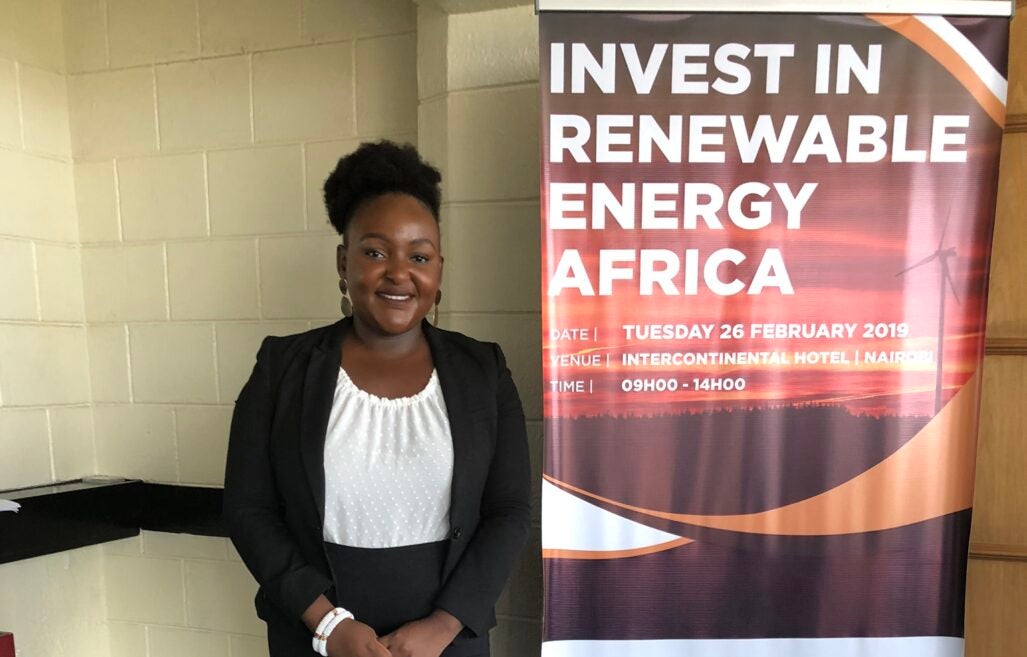Nobody ever said the clean energy transition would be easy, but having more people like Wangari Muchiri in the world would make the task easier. After seven years in Australia, the 30-year-old renewable energy engineer returned to her home country of Kenya in 2015.
Working for Hivos Foundation, a Dutch NGO, her mission now is to connect off-grid communities to clean energy by finding and supporting innovative projects that can be scaled up and benefit millions of people in remote areas across Eastern Africa. For this work, she was recently rewarded with a global renewable energy award. Energy Monitor caught up with her as she celebrated a double triumph.

When climate activist and clean energy pioneer Steve Sawyer died in 2019, the Global Wind Energy Council, Greenpeace and think-tank REN21 came together to create an award in his name that would empower young innovators working at the forefront of the renewable energy revolution in Africa, Latin America and South East Asia. Muchiri is the inaugural winner.
Kenya is a global clean energy leader. More than 90% of its energy comes from renewables, mainly hydro and geothermal. The country also boasts the largest grid-connected solar power plant in East and Central Africa – the 50MW Garissa plant supplies around 2% of Kenya’s energy – and hosts the biggest wind farm in Africa. The 310MW Lake Turkana Wind Farm provides around 17% of the country’s installed energy capacity.
On the other side of the coin, nearly half the population still has no access to the electricity grid. This lack of access is either because people live in remote areas where grid extension is too expensive or they can’t afford to plug in. Connecting to the grid means handing over a “hefty contribution fee of KES15,000 (€118) to the local utility,” explains Muchiri. “Those who do connect may not be able to afford the cost per kilowatt hour of electricity used.” More than third of Kenyans live on less than the international poverty line of $1.90 a day. Furthermore, over 80% of Kenyans still rely on heavy-polluting biomass as their main source of energy for cooking and heating.

US Tariffs are shifting - will you react or anticipate?
Don’t let policy changes catch you off guard. Stay proactive with real-time data and expert analysis.
By GlobalDataThinking big
Every individual connected to a clean energy grid thanks to her work is clearly a success story for Muchiri, but her ambitions are much greater than single households or communities. Her focus is finding projects that ultimately can be scaled up and benefit millions, with those led by women or young people being of particular interest.
The latest initiative she is championing is a smart grid, blockchain-powered solar technology device that enables its owners to generate electricity and also sell surplus energy to their neighbours.
“If a school, for example, has excess solar power, say at the weekend when the building is empty, it can use the device to easily trade the energy and sell it to nearby houses at a low cost,” says Muchiri.
“The pilot project will impact around 50 people,” she says. However, this is only the first step. She and her team then work with the private sector to get the financing and with governments to get the policies needed to scale-up projects.
“We want to be able to step away once the five-year project is done and know that millions of people will continue to benefit and remain connected to the grid,” says Muchiri.
In addition to finding the right projects and bringing in donors to fund them, a big challenge is “behavioural change”, she explains. “People are often scared of new technology, they find it intimidating and fear it will be too expensive. As soon as we turn our backs, they ditch the new equipment and go back to their traditional cook stoves.”
For all her knowledge and enthusiasm, Muchiri says the best behaviour-change ambassadors are people on the ground.
“We educate local energy champions, such as schoolteachers or shopkeepers who have solar panels on their roof, or elders,” she says. “We train them and they liaise directly with people in the community.”
Kenya is aiming to run totally off clean energy by 2030 and to reduce its reliance on hydropower by increasing the amount of solar and wind in the country. Efforts to reach this goal are being slowed by the fact the country only has one utility, Kenya Power, suggests Muchiri.
“The biggest challenge we have is that we have an energy monopoly,” she says. “Developers are only allowed to sell electricity to Kenya Power, but they need to be able to sell to others to develop the market.”
Muchiri is hopeful the market will open up in the coming years. In 2019, a new energy act was published that allows the free movement of electricity along transmission lines, known as ‘wheeling’. “This could liberalise the energy market if the right actors come together,” says Muchiri.
She is particularly excited by the potential for the legislation to bring in private sector investment and open up the possibility for corporate power purchase agreements (PPAs), which allow corporates to purchase renewable energy directly from an energy generator, to play a part in boosting the development of renewables.
“PPAs are virtually non-existent in this market in Kenya and I feel this would be a huge opportunity, especially in the manufacturing sector,” she says.
Muchiri will collect her prize at this year’s Windaba, South Africa’s main wind conference, on 26–27 October – and she will be doing so with a babe in arms. The day she learnt she had won the REvolutionaries Award, she was giving birth to her daughter Wanja.



